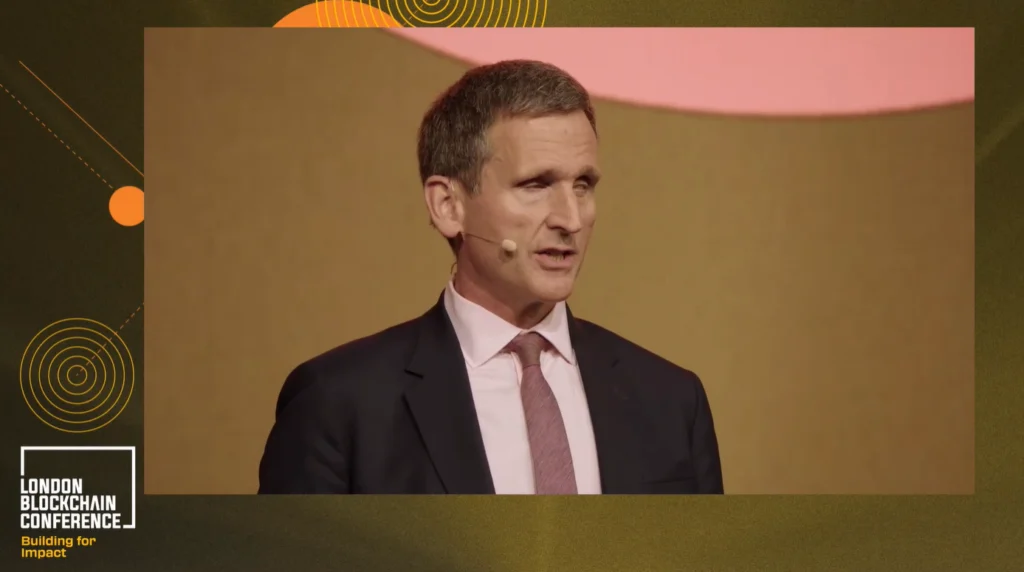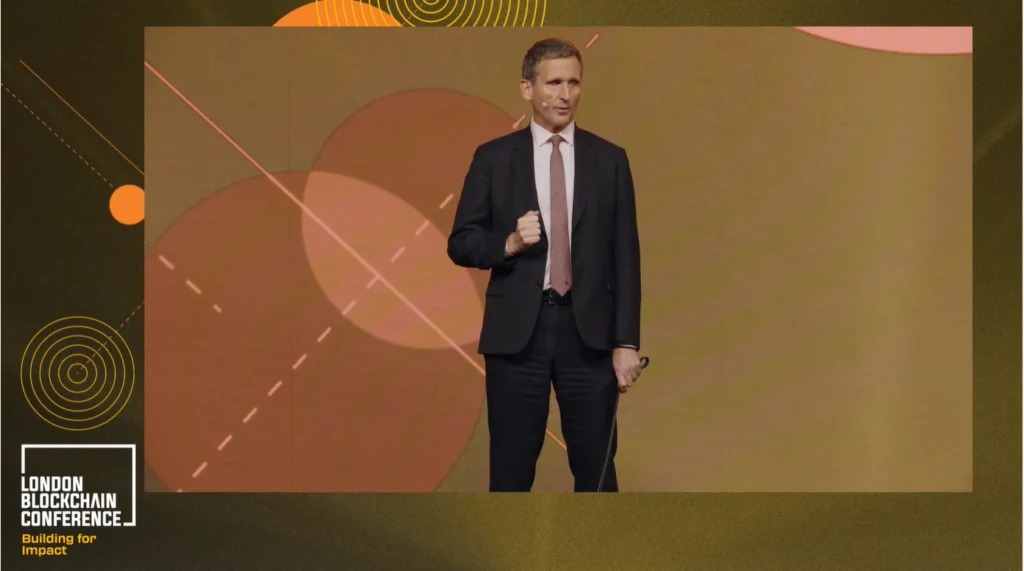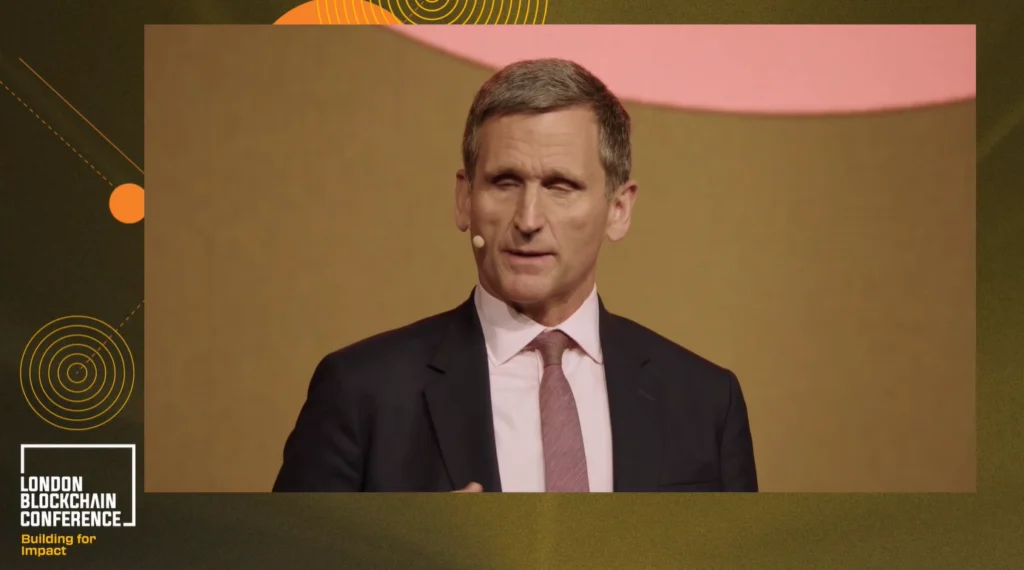|
Getting your Trinity Audio player ready...
|
On October 23, Christopher Holmes, a member of the United Kingdom House of Lords, spoke of the “extraordinary potential” of blockchain to transform public services, not just as a technology, but as a strategic enabler of a fairer, more efficient digital society.
- Christopher Holmes at the London Blockchain Conference
- Blockchain benefits the election process
- Blockchain can help improve the National Health Service
- CTA: Blockchain is a value creator in chief
- Lord Holmes’ former blockchain efforts
Speaking on the second day of the London Blockchain Conference 2025, Lord Holmes—whose official title is Baron Holmes of Richmond—explained how blockchain can deliver trusted trade and transparency across public systems, as well as eliminate inefficiencies in the NHS and other core services.

“What extraordinary potential we have if we think about what we can achieve with blockchain,” began Holmes, speaking from the “Visionaries Stage” of the London Blockchain Conference. “It’s all too easy for people to sit back and think we’re just at the will of this, we can’t possibly influence it, but that’s completely the wrong response. We need to commit, we need to focus, and we need to lead with these technologies.”
Holmes argued it was “self-evident” that governments can’t keep doing the same approach that they have up to this point, saying “we have a democratic, social and economic imperative to act to rewire the public sector.”
One of the key tools needed for this rewiring, according to Holmes, is blockchain.
Blockchain for elections
During his impassioned speech, he shared several examples of where he sees huge benefits from deploying blockchain technology, the first being elections.
“Last year, two billion of us went to the polls around the world, but where was any narrative around these technologies, around what blockchain could do for our citizens, for our societies, absent from most of the discussion… yet it could have been beneficial in the very act of the electoral process itself,” said Holmes.
He went on to argue that blockchain could have helped solve the “loose relationship with fact” that often appeared around election time.
“Simple blockchain solution could validate and verify the claims given by all those politicians and political parties around the world,” suggested Holmes. But that’s not all, he added that “imagine blockchain being used for the very act of making your vote, and imagine the electoral roll itself, that register of those eligible to vote could be well structured and well supported with a blockchain application.”
This, said Holmes, could deliver more reliable elections that are beyond reproach or challenge.

Public services: the NHS
Another major issue that is never far from public debate in the U.K. is the National Health Service (NHS)—the beleaguered, underfunded, inefficient, and terminally maligned NHS.
Lord Holmes spoke of how blockchain technology could be applied to solve some of the persistent problems with the NHS, such as freeing up doctors from time wasted on administrative tasks.
According to Holmes, “25,000 doctor days are currently used in proofing credentials. It’s incredibly important, you want to know the person operating on you, consulting you, has the qualifications, the skills, the expertise that she or he is claiming to have.”
But when waiting lists are ever longer and budgets are ever tighter, is this an efficient use of time? Not for Holmes: “Imagine blockchain deployment, those 25,000 doctor days could be converted into 25,000 days of care.”
A call to action
More broadly, Lord Holmes spoke of the general benefit blockchain can provide to economic growth, an area the U.K. is sorely in need of a boost. The U.K. Chancellor of the Exchequer, Rachel Reeves, recently revealed that the long-term damage done to the U.K. economy by the 2020 Brexit deal was worse than expected.
“Of course, any government wants growth, but if you want growth, there has to be an unflinching, consistent, and coherent approach to it,” said Holmes. “So much of it can come, and must come, from all of these so-called new technologies, not least blockchain and distributed ledgers.”
He rounded off his keynote speech to the London Blockchain Conference by emphasizing that “blockchain isn’t just a supreme means for the exchange of value, it’s a very value creator in chief.”
Holmes’ track record

When it comes to backing blockchain, Lord Holmes’ practice what he preaches, having for some time advocated in Parliament for increased blockchain adoption across sectors.
As far back as November 2017, Holmes published a report calling on the U.K. Government to explore how Distributed Ledger Technologies (DLT) can be used for the public good.
“With the right mix of leadership, collaboration and sound governance, DLT offers a step change for service delivery in both the public and private sectors,” said Holmes in the report. “By reducing data fragmentation and enhancing traceability and accountability, DLT promises cost‐savings and efficiencies on a scale sufficient to impact national finances.”
He added that “DLT’s facilitation of common business processes, based on common and authoritative reference and transaction data, provides the means to derive improved returns and efficiencies from past and future investments, including legacy systems, through enhanced interoperability.”
Since then, Holmes has continued urging the government to ensure that it act sooner rather than later, “to ensure the benefit is realized for the public good.”
This effort hasn’t fallen on deaf ears. In April, Chancellor Reeves set out the government’s plan to bring digital assets within the U.K.’s regulatory regime, whilst also emphasizing that “the government remains committed to making the U.K. a global hub for digital asset technologies.”
She added that “through our Plan for Change, we are making Britain the best place in the world to innovate — and the safest place for consumers.”
This likely came as music to the ears of Lord Holmes, who concluded his October 23 speech to the London Blockchain Conference by saying: “We must ask what we can do to transform, to reshape, to reset our economies and our societies, for the benefit and the betterment of citizens and state alike… It’s our data, our DLTs, our decisions, our digital futures together, our human-led digital futures.”
Watch: London Blockchain Conference│Day 1 Recap

 03-05-2026
03-05-2026 




